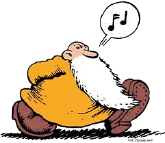Tuesday December 21, 2021; 7:42 AM EST
 I asked this question on the blog and on Twitter yesterday. And so far all the answers have been about the companies, and imho they've been wrong. First, there are plenty of huge tech companies that have set out to own podcasting, and were fairly sure their dominance in other categories would help them achieve dominance in podcasting. I've listened to their bluster and at times have been worried that it might work. After all Google owns search, and Apple made the iPod (and therefore it's assumed by many that they invented podcasting). Amazon owns Audible which dominates audiobooks. Spotify is huge, and they've set out to dominate podcasting, and maybe they will, but they haven't so far. #
I asked this question on the blog and on Twitter yesterday. And so far all the answers have been about the companies, and imho they've been wrong. First, there are plenty of huge tech companies that have set out to own podcasting, and were fairly sure their dominance in other categories would help them achieve dominance in podcasting. I've listened to their bluster and at times have been worried that it might work. After all Google owns search, and Apple made the iPod (and therefore it's assumed by many that they invented podcasting). Amazon owns Audible which dominates audiobooks. Spotify is huge, and they've set out to dominate podcasting, and maybe they will, but they haven't so far. #- Second, how do I know that no single tech company dominates podcasting, or as some people claim a few of them do? Because the market doesn't behave like one that is dominated. There is no gatekeeper that can turn down your podcast, make you not cover topics they don't want covered or use language or images they don't think are acceptable, or compete with them. All these are features of dominated product categories. The press doesn't turn to Spotify or Apple to blame them for something someone said on a podcast that incited a riot or threatened a celebrity or politician. They don't turn to the companies because they are not dominant and they know it. I know no big tech company dominates podcasting because if you want to start a podcast there's no one who can tell you you can't. If you want to listen to a podast on your favorite player, yes there are some you can't, but you can for the vast majority of them. #
- Now to the question that I actually asked that no one seems to want to answer. Why? Why is it this way? Why podcasting and not the other tech-based media. Why is podcasting still open after over 20 years? Drumroll please. The answer: there are enough users who understand how it is supposed to work. They expect to be able to listen to any podcast anywhere they want. Most probably don't understand why they have this ability, about the history and technology design that made it possible, but they understand that they have the ability. And it doesn't have to be all of them or even most of them, just enough of them, whatever that means. And for right now, at the end of 2021, there are enough. Podcasting has always been and remains an open platform. I can't say it will be for the future, but so far so good. #
 I'm not saying this as a form of self-congratulation, or an appeal for kudos, though I gratefully accept any that are offered. I'm focusing your attention on this because we can do it again. Start a new medium with the understanding that users have the right to move, the right to use any tool they want to create media or listen to (or read or view or experience) it. That there are no gatekeepers that control them. #
I'm not saying this as a form of self-congratulation, or an appeal for kudos, though I gratefully accept any that are offered. I'm focusing your attention on this because we can do it again. Start a new medium with the understanding that users have the right to move, the right to use any tool they want to create media or listen to (or read or view or experience) it. That there are no gatekeepers that control them. #- In other words the example of podcasting says there's hope. We don't have to accept a bad answer. We can have freedom, and users are the key to that. I've always said that, because it's true. Users have the power, but they have to use it. But first developers have to set it up from the beginning so they are not locked in and so creators are not controlled. To set the expectation that they have the freedom to not be.#